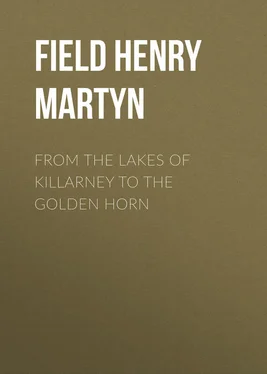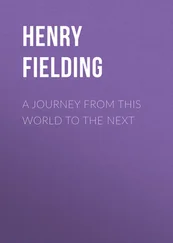Henry Field - From the Lakes of Killarney to the Golden Horn
Здесь есть возможность читать онлайн «Henry Field - From the Lakes of Killarney to the Golden Horn» — ознакомительный отрывок электронной книги совершенно бесплатно, а после прочтения отрывка купить полную версию. В некоторых случаях можно слушать аудио, скачать через торрент в формате fb2 и присутствует краткое содержание. Жанр: foreign_antique, foreign_prose, Путешествия и география, на английском языке. Описание произведения, (предисловие) а так же отзывы посетителей доступны на портале библиотеки ЛибКат.
- Название:From the Lakes of Killarney to the Golden Horn
- Автор:
- Жанр:
- Год:неизвестен
- ISBN:нет данных
- Рейтинг книги:5 / 5. Голосов: 1
-
Избранное:Добавить в избранное
- Отзывы:
-
Ваша оценка:
- 100
- 1
- 2
- 3
- 4
- 5
From the Lakes of Killarney to the Golden Horn: краткое содержание, описание и аннотация
Предлагаем к чтению аннотацию, описание, краткое содержание или предисловие (зависит от того, что написал сам автор книги «From the Lakes of Killarney to the Golden Horn»). Если вы не нашли необходимую информацию о книге — напишите в комментариях, мы постараемся отыскать её.
From the Lakes of Killarney to the Golden Horn — читать онлайн ознакомительный отрывок
Ниже представлен текст книги, разбитый по страницам. Система сохранения места последней прочитанной страницы, позволяет с удобством читать онлайн бесплатно книгу «From the Lakes of Killarney to the Golden Horn», без необходимости каждый раз заново искать на чём Вы остановились. Поставьте закладку, и сможете в любой момент перейти на страницу, на которой закончили чтение.
Интервал:
Закладка:
It is probably quite within bounds to say that the accumulation of wealth at this centre is greater than ever was piled up before on the globe, even in the days of the Persian or Babylonian Empires; or when the kings of Egypt built the Pyramids; or when Rome sat on the seven hills, and subject provinces sent tribute from all parts of the earth; or in that Mogul Empire, whose monuments at Delhi and Agra are still the wonder of India.
Can it be that a city so vast, so populous, so rich, has a canker at its root? Do not judge hastily, but see for yourself. Leave Hyde Park Corner, and its procession of nobles and princes; leave "the city," with its banks and counting-houses, and plunge into another quarter of London. One need not go far away, for the hiding-places of poverty and wretchedness are often under the very shadow of the palaces of the rich. Come, then, and grope through these narrow streets. You turn aside to avoid the ragged, wretched creatures that crouch along your path. But come on, and if you fear to go farther, take a policeman with you. Wind your way into narrow passages, into dark, foul alleys, up-stairs, story after story, each worse than the last. Summon up courage to enter the rooms. You are staggered by the foul smell that issues as you open the doors. But do not go back; wait till your eye is a little accustomed to the darkness, and you can see more clearly. Here is a room hardly big enough for a single bed, yet containing six, eight, ten, or a dozen persons, all living in a common herd, cooking and eating such wretched food as they have, and sleeping on the floor together.
What can be expected of human beings, crowded in such miserable habitations, living in filth and squalor, and often pinched with hunger? Not only is refinement impossible, but comfort, or even decency. What manly courage would not give way, sapped by the deadly poison of such an air? Who wonders that so many rush to the gin-shop to snatch a moment of excitement or forgetfulness? What feminine delicacy could stand the foul and loathsome contact of such brutal degradation? Yet this is the way in which tens, and perhaps hundreds of thousands of the population of London live.
But it is at night that these low quarters are most fearful. Then the population turns into the streets, which are brilliantly lighted up by the flaring gas-jets. Then the gin-shops are in their glory, crowded by the lowest and most wretched specimens of humanity – men and women in rags – old, gray-headed men and haggard women, and young girls, – and even children, learning to be imps of wickedness almost as soon as they are born. After a few hours of this excitement they reel home to their miserable dens. And then each wretched room becomes more hideous than before, – for drinking begets quarrelling; and, cursing and swearing and fighting, the wretched creatures at last sink exhausted on the floor, to forget their misery in a few hours of troubled sleep.
Such is a true, but most inadequate, picture of one side of London. Who that sees it, or even reads of it, can wonder that so many of these "victims of civilization," finding human hearts harder than the stones of the street, seek refuge in suicide? I never cross London Bridge without recalling Hood's "Bridge of Sighs," and stopping to lean over the parapet, thinking of the tragedies which those "dark arches" have witnessed, as poor, miserable creatures, mad with suffering, have rushed here and thrown themselves over into "the black-flowing river" 2 2 "The bleak wind of March Made her tremble and shiver, But not the dark arch, Nor the black flowing river. Mad from life's history, Glad to death's mystery Swift to be hurled Anywhere, anywhere, Out of the world"
beneath, eager to escape
"Anywhere, anywhere,
Out of the world!"
Such is the dreadful cancer which is eating at the heart of London – poverty and misery, ending in vice and crime, in despair and death. It is a fearful spectacle. But is there any help for it? Can anything be done to relieve this gigantic human misery? Or is the case desperate, beyond all hope or remedy?
Of course there are many schemes of reformation and cure. Some think it must come by political instrumentality, by changes in the laws; others have no hope but in a social regeneration, or reconstruction of society, others still rely only on moral and religious influences.
There has arisen in Europe, within the last generation, a multitude of philosophers who have dreamed that it was possible so to reorganize or reconstruct society, to adjust the relations of labor and capital, as to extinguish poverty; so that there shall be no more poor, no more want. Sickness there may be, disease, accident, and pain, but the amount of suffering will be reduced to a minimum; so that at least there shall be no unnecessary pain, none which it is possible for human skill or science to relieve. Elaborate works have been written, in which the machinery is carefully adjusted, and the wheels so oiled that there is no jar or friction. These schemes are very beautiful; alas! that they should be mere creations of the fancy. The apparatus is too complicated and too delicate, and generally breaks to pieces in the very setting up. The fault of all these social philosophies is that they ignore the natural selfishness of man, his pride, avarice, and ambition. Every man wants the first place in the scale of eminence. If men were morally right – if they had Christian humility or self-abnegation, and each were willing to take the lowest place – then indeed might these things be. But until then, we fear that all such schemes will be splendid failures.
In France, where they have been most carefully elaborated, and in some instances tried, they have always resulted disastrously, sometimes ending in horrible scenes of blood, as in the Reign of Terror in the first Revolution, and recently in the massacres of the Commune. No government on earth can reconstruct society, so as to prevent all poverty and suffering. Still the State can do much by removing obstacles out of the way. It need not be itself the agent of oppression, and of inflicting needless suffering. This has been the vice of many governments – that they have kept down the poor by laying on them burdens too heavy to bear, and so crushing the life out of their exhausted frames. In England the State can remove disabilities from the working man; it can take away the exclusive privileges of rank and title, and place all classes on the same level before the law. Thus it can clear the field before every man, and give him a chance to rise, if he has it in him – if he has talent, energy, and perseverance.
Then the government can in many ways encourage the poorer classes, and so gradually lift them up. In great cities the drainage of unhealthy streets, of foul quarters, may remove the seeds of pestilence. Something in this way has been done already, and the death rates show a corresponding diminution of mortality. So by stringent laws in regard to proper ventilation, forbidding the crowding together in unhealthy tenements, and promoting the erection of model lodging-houses, it may encourage that cleanliness and decency which is the first step towards civilization.
Then by a system of Common Schools, that shall be universal and compulsory , and be rigidly enforced, as it is in Germany, the State may educate in some degree, at least in the rudiments of knowledge, the children of the nation, and thus do something towards lifting up, slowly but steadily, that vast substratum of population which lies at the base of every European society.
But the question of moral influence remains. Is it possible to reach this vast and degraded population with any Christian influences, or are they in a state of hopeless degradation?
Here we meet at the first step in England A CHURCH, of grand proportions, established for ages, inheriting vast endowments, wealth, privilege, and titles, with all the means of exerting the utmost influence on the national mind. For this what has it to show? It has great cathedrals, with bishops, and deans, and canons; a whole retinue of beneficed clergy, men who read or "intone" the prayers; with such hosts of men and boys to chant the services, as, if mustered together, would make a small army. The machinery is ample, but the result, we fear, not at all corresponding.
Читать дальшеИнтервал:
Закладка:
Похожие книги на «From the Lakes of Killarney to the Golden Horn»
Представляем Вашему вниманию похожие книги на «From the Lakes of Killarney to the Golden Horn» списком для выбора. Мы отобрали схожую по названию и смыслу литературу в надежде предоставить читателям больше вариантов отыскать новые, интересные, ещё непрочитанные произведения.
Обсуждение, отзывы о книге «From the Lakes of Killarney to the Golden Horn» и просто собственные мнения читателей. Оставьте ваши комментарии, напишите, что Вы думаете о произведении, его смысле или главных героях. Укажите что конкретно понравилось, а что нет, и почему Вы так считаете.












